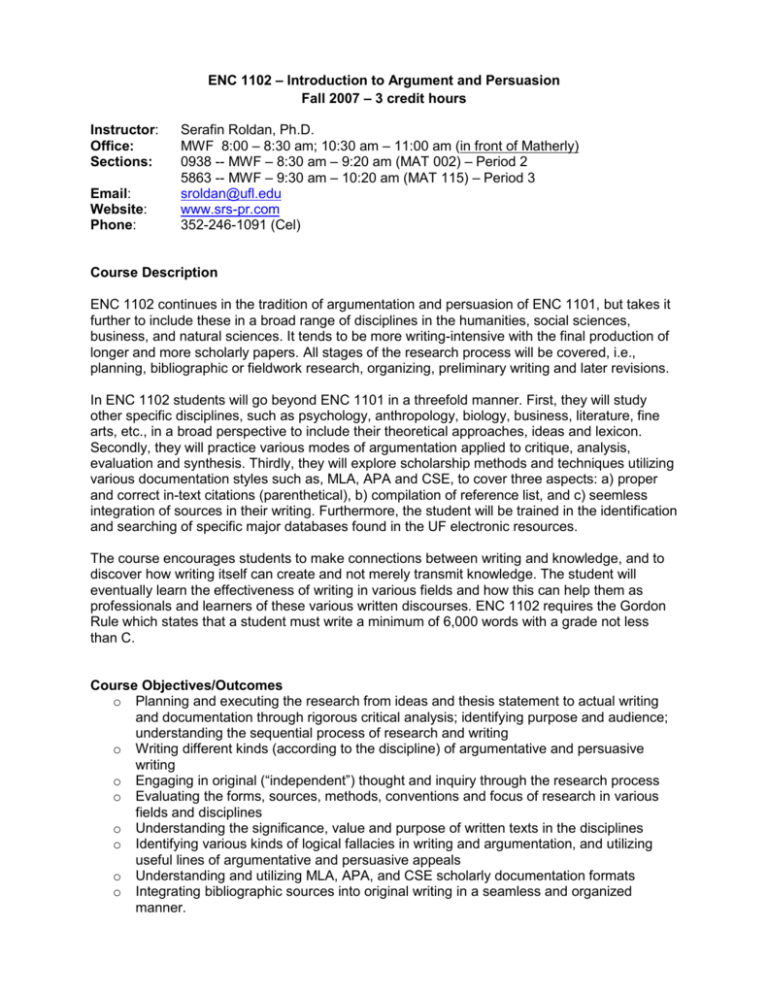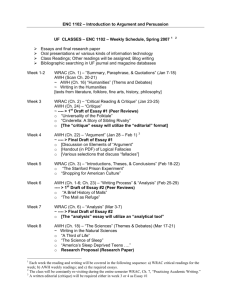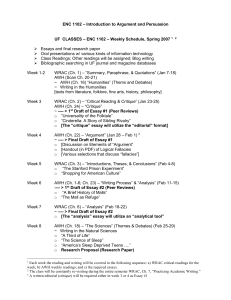
ENC 1102 – Introduction to Argument and Persuasion
Fall 2007 – 3 credit hours
Instructor:
Office:
Sections:
Email:
Website:
Phone:
Serafin Roldan, Ph.D.
MWF 8:00 – 8:30 am; 10:30 am – 11:00 am (in front of Matherly)
0938 -- MWF – 8:30 am – 9:20 am (MAT 002) – Period 2
5863 -- MWF – 9:30 am – 10:20 am (MAT 115) – Period 3
sroldan@ufl.edu
www.srs-pr.com
352-246-1091 (Cel)
Course Description
ENC 1102 continues in the tradition of argumentation and persuasion of ENC 1101, but takes it
further to include these in a broad range of disciplines in the humanities, social sciences,
business, and natural sciences. It tends to be more writing-intensive with the final production of
longer and more scholarly papers. All stages of the research process will be covered, i.e.,
planning, bibliographic or fieldwork research, organizing, preliminary writing and later revisions.
In ENC 1102 students will go beyond ENC 1101 in a threefold manner. First, they will study
other specific disciplines, such as psychology, anthropology, biology, business, literature, fine
arts, etc., in a broad perspective to include their theoretical approaches, ideas and lexicon.
Secondly, they will practice various modes of argumentation applied to critique, analysis,
evaluation and synthesis. Thirdly, they will explore scholarship methods and techniques utilizing
various documentation styles such as, MLA, APA and CSE, to cover three aspects: a) proper
and correct in-text citations (parenthetical), b) compilation of reference list, and c) seemless
integration of sources in their writing. Furthermore, the student will be trained in the identification
and searching of specific major databases found in the UF electronic resources.
The course encourages students to make connections between writing and knowledge, and to
discover how writing itself can create and not merely transmit knowledge. The student will
eventually learn the effectiveness of writing in various fields and how this can help them as
professionals and learners of these various written discourses. ENC 1102 requires the Gordon
Rule which states that a student must write a minimum of 6,000 words with a grade not less
than C.
Course Objectives/Outcomes
o Planning and executing the research from ideas and thesis statement to actual writing
and documentation through rigorous critical analysis; identifying purpose and audience;
understanding the sequential process of research and writing
o Writing different kinds (according to the discipline) of argumentative and persuasive
writing
o Engaging in original (“independent”) thought and inquiry through the research process
o Evaluating the forms, sources, methods, conventions and focus of research in various
fields and disciplines
o Understanding the significance, value and purpose of written texts in the disciplines
o Identifying various kinds of logical fallacies in writing and argumentation, and utilizing
useful lines of argumentative and persuasive appeals
o Understanding and utilizing MLA, APA, and CSE scholarly documentation formats
o Integrating bibliographic sources into original writing in a seamless and organized
manner.
o
o
o
Understanding the value and importance of peer review and multiple revisions in order to
achieve an effective final product
Refining writing through proper mechanical, grammatical and stylistic structures, while at
the same time producing, critiquing and revising original work
Becoming skilled in searching and evaluating both print and electronic resources in your
research, including UF journal and magazine databases
Course Requirements:
The course requires three short papers (1200 words each) and one longer research paper
(2600 words) spread out throughout the semester. All four papers will have different levels of
documentation, using the disciplines specific documentation style. Each essay will consist of
various phases through which the student must go through, including analysis of purpose and
audience, thesis statement, outlining procedures, bibliographic research and database
searching, and a series of drafts before the final paper is handed in. The last research paper will
be supplemented by a group oral presentation in which oral competencies are demonstrated.
The final component will also include blog writing which will be required.
Writing across the curriculum will form part of the requisites.The focus will be on acquiring a
knowledge base and techniques fundamental to research writing in various disciplines. Students
are encouraged to research topics thoroughly, with online and print resources, and will have
access to tutorial support from the University’s Reading and Writing Center and the Online
Writing Laboratory (OWL).
Research Essays and Papers
In all four argumentative essays, the student will include paragraphs and sections that utilize the
various rhetorical and argumentative modes listed below; All essays will be documented using
MLA style, and others such as APA and CSE. The last essay can be considered a “final
research paper” with a word count of 2600 words. 1 2
1
2
Essay #1 utilizing Critique (100 pts)
Subject Area: Humanities: Literature, Art, Performing Arts
Essay Type: Textual Criticism; Literary analysis; Others
References: At least three (3) references from journal databases
1200 words
Essay #2 utilizing Analysis (100 pts)
Subject Area: Social Sciences: Sociology, Psychology, Anthropology
Essay Type: Critical analysis; Explanation; non-textual analysis
References: At least three (3) references from journal databases
1200 words
Essay #3 utilizing Evaluation and Explanation (100 pts)
Subject Area: Natural Sciences: Biology, Ecology, Physics, Chemistry
Essay Type: Evaluative analysis; Causal analysis
References: At least three (3) references from journal databases
1200 words
See schedule for essay submission dates
Specific instructions will be given for each essay.
Final Paper #4 utilizing Synthesis (Argumentative) (150 pts)
Subject Area: Business and Economics OR One Area Above
Essay Type: Synthesis and evaluation; comparative techniques
References: At least three (7) references from multiple sources
[Paper will include summary, evaluation, analysis, and other modes]
2600 words
Blog Writing #5 - Continuous Blog Writing (50 pts)
[16 entries]
Oral Competency and Information Technology
Panel Discussions (groups of two or three students)
Powerpoint presentations (groups “ “ )
Web-Site Design (groups of “ “ )
Class Web-Log or Blog (individual contributions) 3
Evaluation
Essays and papers will be evaluated according to the following seven criteria, all essential and
interconnected. Mechanical aspects such as paper length and format will also serve as
requirements including the application of MLA, APA and CSE rules and procedures.
Purpose: Specific purpose and focus; discipline specific; audience need.
Subject Content: Mature and detailed approach to the topic; development of strong arguments;
appropriateness of material; knowledgeable treatment of subject details and points; subjectspecific conventions and lexicon.
Organization: Thesis statement; appropriate body paragraphs with supporting arguments;
efficient style; logical interconnections between introductory and body paragraphs, and
conclusion. The longer paper will include “sections” and/or subdivisions.
Construction: Appropriate mechanical aspects of paragraph construction; length of paragraphs;
transitional devices; parallelisms and other structures.
Language Use: Appropriateness of language and diction; lexicon; correct use of denotation and
connotation; logical syntax order; signal phrases for all citations.
Grammar and Mechanics: Various proofreadings and revisions; spelling and typographical
errors; other grammatical aspects.
MLA – APA – CSE Documentation Styles: The three areas of a) proper and efficient integration
of sources and writing; b) correct in-text (parenthetical citation); and c) proper “Bibliography”,
“Works Cited” or “References” pages.
Grades: Four Essays (450 pts.) + Blog Contributions (50 pts) + (Class Discussions) = 500 pts.
Grading Scale: 90-100 (A); 87-89 (B+); 83-86 (B); 79-82 (B-); 76-78 (C+); 72-75 (C); 69-71
(C-); 60-68 (D); Below 60 (E/F)
The Blog or Weblog writing will be required of all students. It will serve as a collaborative “journal”; see
“Grading” under “Evaluation.”
3
Required Texts
Writing and Reading Across the Curriculum. 9th ed. Eds. Laurence Behrens and Leonard
J. Rosen. New York: Pearson, Longman, 2007.
The Academic Writer’s Handbook. Ed. Leonard J. Rosen. New York: Pearson,
Longman, 2006.
Access to Oxford English Dictionary [electronic version; UF database]
Access to application software, such as Powerpoint, Dreamweaver, and Blog SW
Policy Statements: Attendance
Attendance is required. The policy of the University Writing Program is that if you miss more
than six periods during the term, you will fail the entire course. The UWP exempts from
this policy only those absences involving university-sponsored events, such as athletics and
band, and religious holidays.
Because much of our work depends upon group discussion of the texts and in-class writing
activities, you should plan to attend every class session. However, you may miss up to three
classes without penalty EXCEPT that you will lose credit for whatever in-class work you miss.
Every absence over the allowed three will reduce your overall grade by 50 points (½ of a
letter grade).
Assigned Work Deadlines
You must submit assigned work on the specified due date even if you are absent and even if
you are taking one of your allowed absences. Work submitted late, if I choose to accept it, will
receive a significant grade deduction.
Special Dispensations
If you have a learning disability, hardship, or other special dispensation approved by the Office
of Student Affairs, please meet with me to discuss your requirements as early in the term as
possible.
Tardiness
You should come to class on time. If you do arrive late, please come in as quietly as possible
and begin work quickly. (After class, you must make sure that I change my attendance record to
reflect that you attended after all.) If you are more than 15 minutes late, it will count as an
absence for the entire class session. In such a case, however, you may enter the class and
receive credit for in-class work that you complete during the remaining class time.
Policy Statements: Plagiarism
Plagiarism is a serious violation of the Student Honor Code. You commit plagiarism when you
present the ideas or words of someone else as your own. Remember, you are responsible for
understanding the University's definitions of plagiarism and academic dishonesty, which include
the following:
Submitting all or part of someone else’s work as if it is your own.
“Borrowing,” without crediting the source, any of the following:
o Any part of song lyrics, poetry, or movie scripts
o Any part of another person’s essay, speech, or ideas
o Any part of an article in a magazine, journal, newspaper
o Any part of a book, encyclopedia, CD-ROM, online WWW page, etc.
o Any idea from another person or writer, even if you express that idea in your
own words.
“Borrowing” verbatim text without enclosing in quotation marks and citing the
source.
Making "duplicate submissions" of assignments - that is, submitting work in one
class that you also submit in another class
“Collaborating” or receiving substantive help in writing your assignment unless such
collaboration is part of the given assignment. (However, you may receive general
advice from tutors, writing lab instructors, or OWL staff.)
Failing to cite sources, or citing them improperly.
Important Tip: You should never copy and paste something from the Internet without providing
the exact location from which it came. Read the full Student Honor Code at
http://www.dso.ufl.edu/judicial/procedures/studenthonorcode.php
Plagiarism is a serious violation in any academic setting. You commit plagiarism when
you present the ideas or words of someone else as your own. If a student "plagiarizes" all
or any part of any assignment, I will award him or her a failing grade on the assignment.
Additionally, University policy suggests that, as a MINIMUM, instructors should impose a course
grade penalty and report any incident of academic dishonesty to the Office of the Dean of
Students. You should know that your work might be tested for its “originality” against a wide
variety of databases by anti-plagiarism guardian sites to which the University subscribes, and
negative reports from such sites constitute PROOF of plagiarism. Other forms of academic
dishonesty will also result in a failing grade on the assignment as a minimum penalty.
University of Florida Student Honor Code
Prohibited Collaboration or Consultation. A student shall not without express authorization
collaborate or consult with another person in an academic activity. Prohibited collaboration or
consultation shall include:
a. Collaborating when not authorized to do so on an examination, take-home test, writing
project, assignment, or course required work.
b. Collaborating or consulting in any other academic or co-curricular activity after receiving
written notice that such conduct is prohibited.
c. It is the responsibility of the student to seek clarification whether or not collaboration or
consultation with another person is authorized prior to engaging in any act of collaboration or
consultation. If a faculty member has authorized a student to collaborate or consult with another
person in limited circumstances, the student shall not exceed that authority. If the student
wishes to collaborate or consult with another person in circumstances to which the authority
does not plainly extend, the student shall first ascertain with the faculty member whether the
collaboration or consultation is authorized.
Prohibited Use of Materials or Resources. A student shall not use unauthorized materials or
resources in an academic activity. Unauthorized materials or resources shall include:
a. Any paper or project authored by the student and presented by the student for the satisfaction
of any academic requirement if the student has previously submitted substantially the same
paper or project to satisfy an academic requirement and did not receive express authorization to
submit the paper or project.
b. Any materials or resources prepared by another student and used without the student’s
express consent.
c. Any materials or resources which the faculty member has notified the student in writing are
prohibited.
d. If a faculty member has authorized a student to use specified materials or resources, the
student shall not exceed that authority. If the student wishes to use any material or resource to
which the authority does not plainly extend, the student shall first ascertain whether the use is
authorized.
Plagiarism. A student shall not represent as the student’s own work all or any portion of the
work of another. Plagiarism includes (but is not limited to):
a. Quoting oral or written materials, whether published or unpublished, without proper
attribution.
b. Submitting a document or assignment which in whole or in part is identical or substantially
identical to a document or assignment not authored by the student.
Submission of Paper or Academic Work Purchased or Obtained from an Outside Source.
A student shall not submit as his or her own work a paper or other academic work that was
purchased or otherwise obtained from an outside source. An outside source includes (but is not
limited to) a commercial vendor of research papers, a file of research papers or tests maintained
by a student organization or other body or person, or any other source of papers or of academic
work that was authored or prepared by a person other than the student who submits it. 13.
Conspiracy to Commit Academic Dishonesty. A student shall not conspire with any other person
to commit an act that violates the Honor Code. (4) Jurisdiction for Student Honor Code
Violations (a) Students charged with violations of the Student Honor Code shall have their cases
heard by the appropriate person or body designated in 6C1-4.013. Unless otherwise noted,
students may seek resolution through the Faculty Determination Process.
(http://www.dso.ufl.edu/judicial/procedures/studenthonorcode.php)
…………………………………………..
UF CLASSES – ENC 1102 – Weekly Schedule, Fall 2007 4
Essays and final research paper
Oral presentations w/ various kinds of information technology
Class Readings; Other readings will be assigned; Blog writing
Bibliographic searching in UF journal and magazine databases
Week 1-2
WRAC (Ch. 7) – “Locating, Mining, and Citing Sources”
AWH (Ch. 11-15) – “MLA, APA, CSE”
o Print and Electronic Sources
Ch 7, 11-14
o Aspects of Documentation
Ch 7, 11-14
o “Shopping for American Culture” (WRAC) p. 378
o “A Social History of Shopping”
p. 385
Week 3
WRAC (Ch. 1) – “Summary, Paraphrase, and Quotations”
AWH (Scan Ch. 20-24)
~ --------- > 1st Drafts of essay #1 (see “Essay Assignments”)
o “Universality of the Folktale” (WRAC)
p. 541
o “ ‘Cinderella’: A Story of Sibling Rivalry”
p. 588
Week 4
WRAC (Ch. 2) – “Critical Reading and Critique”
AWH (Ch. 1-3) – “The Writing Process”
~ ------------ > Final essay #1 deadline
o [articles from the “Humanities”
-----
Week 5
WRAC (Ch. 3) – “Introductions, Theses, and Conclusions”
AWH (Ch. 4-6; 9-10) “The Writing Process”
o “The Abu Ghraib Prison …..”
p. 302
o “Opinions and Social Pressure” (WRAC)
p. 306
o “The Genocidal Killer in the Mirror”
p. 362
Week 6
AWH (Ch. 16-17) –“Humanities and Social Sciences”
~ ------------- >1st Drafts of essay #2
o “Hot Coffee Spills”
p. 798
o “The American Legal System”
p. 742
Week 7
WRAC (Ch. 6) – “Analysis”
~ ------------ > Final essay #2 deadline
o “Virtual Love”
o “The Blog Phenomenon”
o “The Intimacy of Blogs”
4
p. 267
p. 256
p. 259
Each week the reading and writing will be covered in the following sequence: a) WRAC critical readings for the
week; b) AWH weekly readings; and c) the required essays.
Week 8
AWH (Ch. 18) – “The Sciences”
o “Too Close to the Bone ….”
o “The Ironic Politics of Obesity”
p. 497
p. 518
Week 9
WRAC (Ch. 4) – “Explanatory Synthesis”
~ -------------- > 1st Drafts of essay #3 (see “Essay Assignments”)
o “Rethinking Weight”
p. 465
o [other science essays]
[to be assigned]
Week 10
AWH (Ch. 19) – “Business Settings”
~ ------------- > Final essay #3 deadline
o “Journey of an E-Mail”
o “The Man Who Couldn’t Stop Eating”
p. 245
p. 520
WRAC (Ch. 5) – “Argument Synthesis”
o “Advertising’s Fifteen Basic Appeals”
o “ The Indictment Against Advertising”
p. 627
p. 655
AWH (Part VIII) – “Editing for Correctness”
~ --------------- > 1st Draft of Final Paper #4
o [Other Business essays]
[to be assigned]
Week 11
Week 12
Week 13
AWH (Part IX) – “Editing for clarity and Emphasis”
o Other drafts of final paper #4
o Other discussions on the research process
Week 14
FINAL PAPER; Wrap-up
srs/7/10/2007












